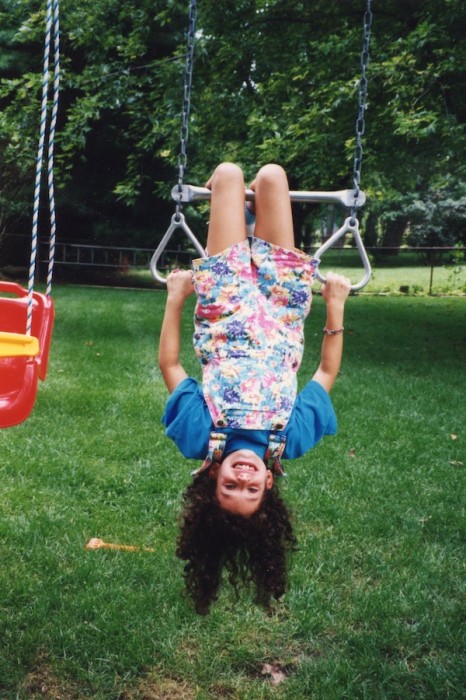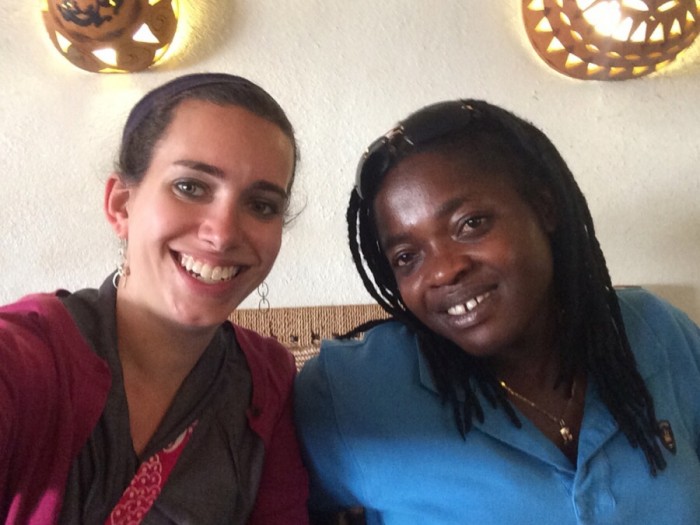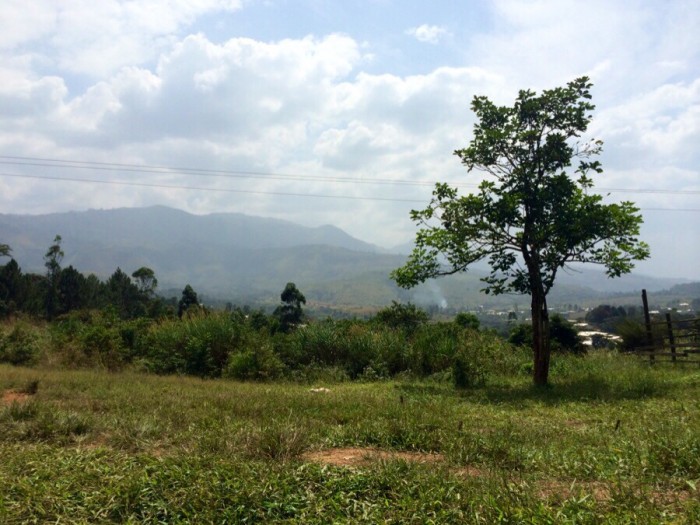November 26th, 2014 by Rachel | Tags: Disability, Peace Corps | 4 Comments »
I have disabilities. I was born profoundly deaf due to Usher Syndrome, a genetic condition that not only causes deafness but also slow progression of blindness. I was fortunate to receive a technology called cochlear implant at age two and a half years old. I attended therapy weekly to learn to hear and speak. My parents spent many hours helping me develop my listening and spoken language skills.

Rachel as a Child
When I was a child, I never went to a school for the deaf or a special school. I went to mainstream school, the same school all kids who heard normally in my neighborhood attended. I was always in the regular classroom and participated in all activities that people with normal hearing did.
Later on in my life, I got a microphone system that consisted a speaker and a microphone for teachers and students to use to help me hear the teachers and students better. I also had support teachers in schools who helped me continue to work on my listening and spoken language skills.
I successfully completed my schooling when I was 19 years old in 2006. I graduated with honors from high school and went onto universities where I successfully completed a bachelors and masters.
I have been fortunate to grow up in an environment where people allowed me to reach my fullest potential and accept me as a female with disabilities. However, if you meet a Cameroonian with a disability, you will see that person will most likely not have earned the same fortunate that I have.
Ruth, a Cameroonian who is from the Northwest and has a disability too, had polio when she was three years old. When she was little, she couldn’t walk. Because she had to be carried to school, she couldn’t go to a regular school. She went to a special school where she learned to use crutches. Then she went to high school and succeeded. She always had difficulties. For example, there are lots of hills and stairs and it’s difficult for her to travel. Also, she has difficulties using the latrines.

Ruth as a Child
Even though Ruth went to a special school, she was still fortunate. Only 2% of all Cameroonians with disability receive formal education.
Why is that?
There are variety of factors, and I will explain them. I would like to first explain what kind of disabilities exist and what are the causes in Cameroon.
Mobility impairment, blindness, deafness, epilepsy, cerebral palsy, HIV/AIDS, and cardiovascular disease are examples of disabilities that exist. Some of many causes are genetics, postnatal complications, accidents including falls from palm trees, polio, malaria and meningitis. Living with a disability is actually a serious health issue as there is very high death rate among children with disabilities. A study has shown that the disabilities of Cameroonians are exacerbated by the restricted environment. That will lead us to the discussion why so few with disabilities attend school.
Many roads are not paved and muddy. The terrains are hilly and in many regions, it’s mountainous. This means that those with mobility impairments face the challenge of moving their body on these landscapes.
As a result, for those with mobility impairment, the face the challenge of getting to places and going to the bathroom.
For those with hearing loss, they face the difficulty of hearing well in a classroom or lecture hall due to noises coming through windows that have no glass and lack of facilities such as microphone system. Also, for people who are deaf and communicate in sign language have to have an interpreter or go to a school for the deaf. Cochlear implants do not exist.
People with disabilities face stigmatization. Most people with disabilities don’t go to school because their parents think that it’s a bad investment and they will never be able to work. Parents think they can’t contribute to the society.
Aside from the problems with education, people who have mobility disability have difficulties going to markets due to bad streets. Even if taxis exist in the town, many chauffeurs will not give them a ride. As a result, they have to go to markets that are the closest to home and food are sometimes more expensive.
My primary assignment as a Peace Corps Volunteer in Bamenda is to work with people with disabilities in the Northwest region. Ruth with whom I was in touch through Mobility International USA prior to coming to Cameroon is my counterpart. A counterpart is a work partner, community host, “security guard” and support person. Since I got to know her in person for the first time last week, I have been in awe by how she does not let anything stop her. In spite of using crutches, she gets around the country very well and moves a lot. She came to Ebolowa for a workshop that I unfortunately missed due to being sick and in Yaounde. She even rides motos! She’s always so cheerful and outgoing. For the next two years, she and I will be working together along with a totally blind man named, Samuel, who is my work supervisor and president of Coordination Unit of Association of Persons with Disabilities, to help improve the lives of people with disabilities. Samuel inspires me because he is so independent and truly moves so freely with the white cane that I couldn’t believe him when he said that he can’t see a single thing. I asked him if he can tell the difference between light and dark and he said, “No. I see absolutely nothing” He’s 100% blind. He’s a father of five boys. I told him, “You give me the confidence knowing that if a cure for vision loss never becomes available and if I do have to live being completely blind, I can still be independent.”

Me and Ruth, my counterpart
The work is going to be very challenging but I’m going to focus on helping one person at time. Ruth said to me today, “Do you know why you have an office with a desk and chair?”
“Why?” I asked. I should note that I did ask Ruth and Samuel when they first showed my office to me two days ago if I’m going to be spending most of my time out interacting with people in communities because I did not come to Africa to sit at the desk all day, especially since the main reason I left my previous job was because I no longer wanted to be at the desk eight hours a day, five days a week.
“Because when you are in the office from time to time, people with disabilities will come to you and ask you to solve all their problems and make their life better.”
“I’m not a fairy with a magic wand,” I said, “But I can educate them on what resources are already available in Cameroon if they are not aware of them and share advice based on my personal experiences.”
Ruth and Samuel have already proved to me in the past two days that I will be really moving around a lot as I’ve already visited one village just outside of Bamenda for a meeting about organizing International Day of Persons with Disabilities yesterday and attended another meeting also about the International Day of Persons with Disabilities today in a different beautiful area of the city. They both told me that I will eventually be doing a lot of traveling throughout Northwest to meet people with disabilities to assess their needs. I’m already very excited about the work!


4 Comments
Varda
November 26, 2014 at 3:06 pm
Every time I read one of your blog posts, I am more amazed than before! You are truly one of the most incredible human beings I have ever met – – and I am so proud to call you my friend! XOXO
Debbi Hook
November 26, 2014 at 4:05 pm
Rachel, you are such an inspiration. Loving your spirit and positive attitude. Keep sharing your posts, I look forward to each one!
Kay Kershman
November 27, 2014 at 9:19 am
You are one exceptional person. The Peace Corps is lucky to have you.
Hugs,
Grandma
Florence Pratt
December 2, 2015 at 6:29 am
Wow, amazing. I am from Cameroon and I am thinking about doing something for deaf in Yaounde my hometown. I am also looking for an opportunity with the Peace Corps. You did an amazing job in Bamenda. Keep up with the good work